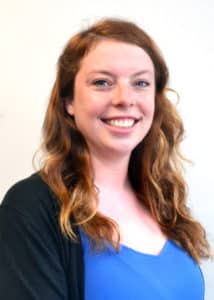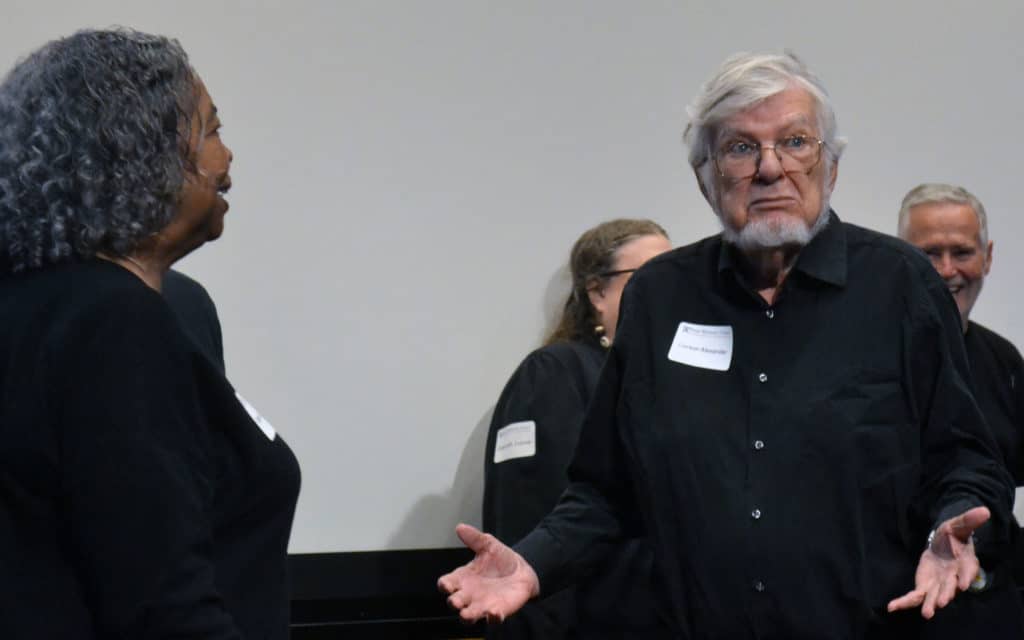A 2016 video introducing the Cognitive Comedy program.
By Varshini Chellapilla
On the Tuesday before Halloween, Glinda the Good Witch, an Italian hotelier with a penchant for wine, a princess with rainbow hair, the Wicked Witch, and an absent-minded man joined together gathered on a video call as part of the Penn Memory Center’s Cognitive Comedy program.
Participants of the program dressed in costumes or assumed different personas to engage in a weekly improv comedy class hosted by Meg Kalafsky, a program and research coordinator at PMC.

The program was originally created in 2015 by Leah Lawler. The goal had been to create a way to encourage social engagement among older adults with cognitive impairments while having fun. A second iteration of the program was intended to begin in the spring of 2020. However, the pandemic changed circumstances.
“What I enjoy most about it at this point is the community that they have built. It’s a mix of caregivers with individuals with impairments,” Kalafsky said. “And it’s the little things that really build the community. Like the way we end each class is by just complimenting each other, so we spent like 10 minutes just talking about how nice everyone was.”
Jean Haskell, a veteran in the field of improv comedy, is responsible for designing the curriculum and structure of current Cognitive Comedy sessions in collaboration with the Penn Memory Center.
Haskell interviewed caregivers, medical experts, research coordinators and people with dementia to understand what her participants would want to achieve from each session and what activities would be valuable to them. She wanted to create exercises that would challenge her audience but, mainly, provide them with emotional support and laughter in the midst of the pandemic.

Much like in traditional improv, participants in the Penn Memory Center’s Cognitive Comedy play off of each other, running scenes or throwing each other imaginary balls of varying sizes, for example. Though some facets changed as the sessions went virtual, the program remains well-loved and well-attended.
“I try to figure out what’s going to be challenging for people, what’s going to make them laugh a little bit, what’s going to help them to feel connected to each other — because that’s an important goal for memory patients — and how they can feel connected on the screen,” Haskell said.
Some of the exercises Haskell has introduced include the all-time favorite ball toss, in which an imaginary object is tossed between random members of the group with the condition that the object changes with every toss. From mythical creatures to fruits to slinkies, the ball takes various shapes before it is retired for the day. This particular game also acts as a way for participants to introduce themselves to the group and learn each other’s names.
Following the initial game, participants move on to other exercises like creating commercials for bizarre goods, scavenger hunts with household items, and acting out different scenes in a group setting.
“They’re very funny and very creative,” Haskell said. “They seem so happy to have this time to laugh and have some fun. And they seem very grateful for the opportunity so I feel really good about my ability to do it.”
In the face of the coronavirus pandemic, Kalafsky wanted to continue this program as a way to help participants cope with emotional and mental stress.
“All of us are more isolated than we generally have been. But older adults feel the isolation to the millionth degree,” Kalafsky said. “Some of them can’t even feel comfortable going to the grocery store right now, because of the coronavirus and their health situations.”
Kalafsky believes that the Cognitive Comedy program provides consistent opportunities for older adults with cognitive impairments to socialize and challenge their minds in a collaborative space.
A member had reached out to Kalafsky to say that they didn’t have any of their traditional Thanksgiving plans and they were upset about it. They had wanted to see if anyone in the group wanted to get together and tell jokes together. Soon, plans were made and a few participants plan to spend Thanksgiving together virtually.
“I think that’s a testament to that they came to this class first, right?” Kalafsky said. “They felt that this was the group that they wanted to talk to on a hard day and have some time to laugh. What our class is best at is creating a safe space to socialize and to make some friends.”